PUBLICATIONS
As our work progresses, publications are arising from our research themes and cross-cutting projects. We produce working papers, journal articles, evidence submissions to government enquiries, essays, books and book chapters. Subscribe to our newsletter to receive a monthly digest in your inbox. If you want to hear more frequently from us, you can subscribe to email updates from the website directly.
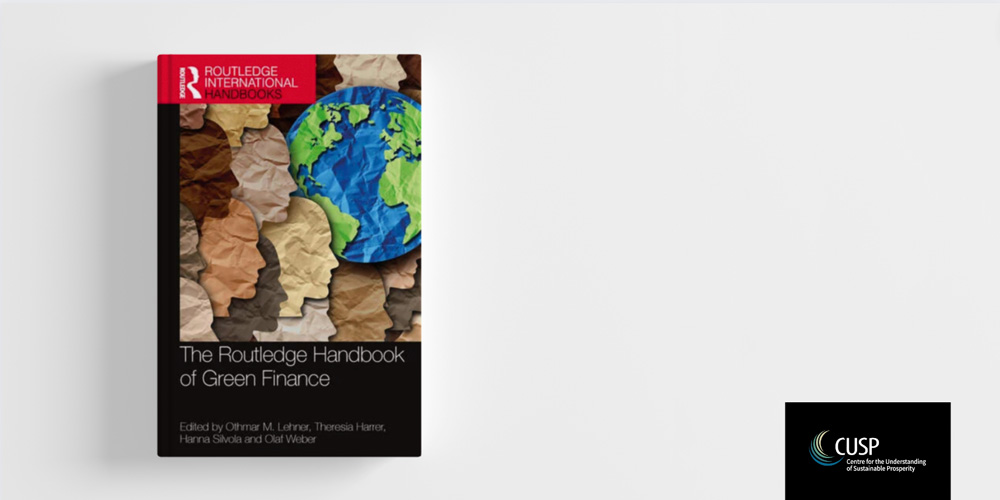
The Routledge Handbook of Green Finance offers an authoritative overview of green finance—its characteristics, principles, mechanisms, and the interplay within environmental, social, and governance measurements. The handbook also critiques existing practices and poses future research questions.

The paper explores energy justice narratives in popular culture, focusing on five Doctor Who episodes from the 1960s, 70s and 80s, highlighting the series’ limited critique of energy production and the class system. The show’s narratives of paternalistic rescue and technological progress remain highly relevant to current energy transition discussions.
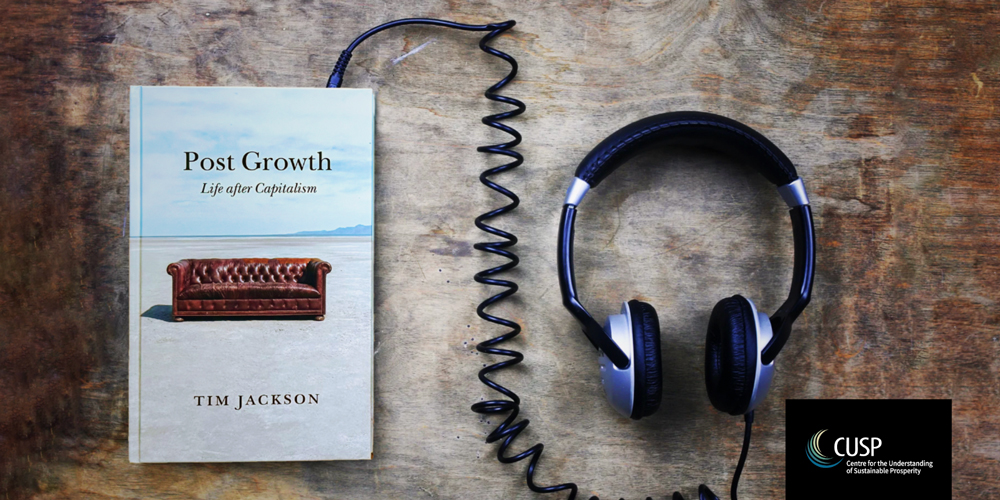
We are pleased to announce the release of the audiobook edition of Tim Jackson’s prize-winning book “Post Growth—Life After Capitalism”. Through his own narration, Tim brings a personal touch to the profound themes of Post Growth, offering an accessible and engaging experience for audiences to absorb his insights on the go.

This paper critically examines the potential effects of commercialising psychedelic substances. Drawing parallels with the well-established commercialisation of mindfulness, it discusses the societal tensions and ethical conflicts that may arise, focusing on concerns about distortion of original practices, co-optation reinforcing neoliberal principles, and cost-cutting alterations.
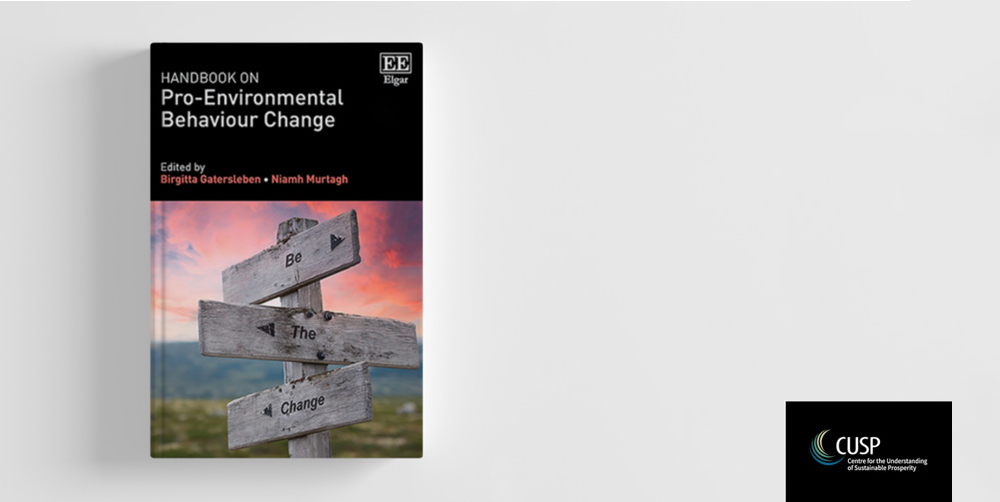
This timely Handbook provides a state-of-the-art overview of research on changing behaviour to become less environmentally harmful. Exploring how well-designed, contextually appropriate behaviour change interventions can work, it charts a path that challenges traditional assumptions to maximise environmental impact.
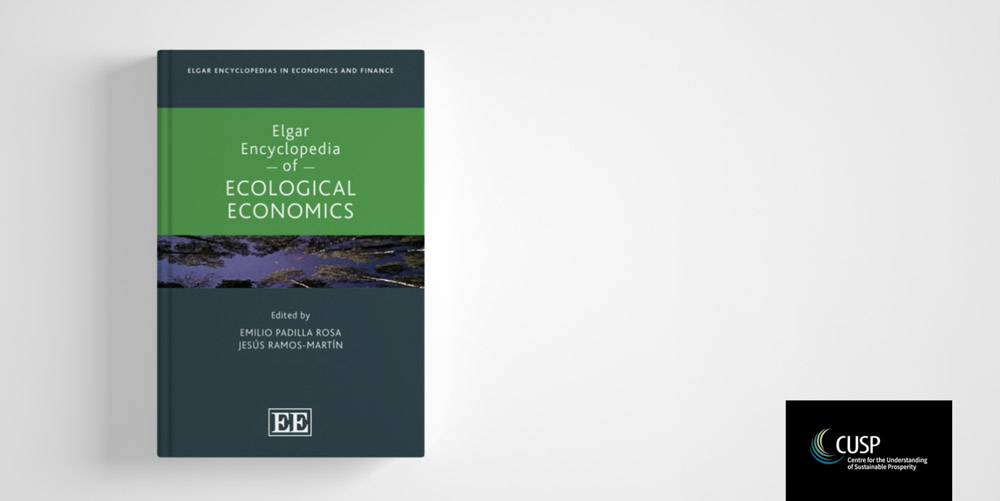
This account of ecological macroeconomics begins with its origins, including the development of some of its defining components by key contributors, followed by an overview of recent research in ecological macroeconomics with an emphasis on models. It concludes with a set of research questions that give some idea of possible future directions for the discipline.

This viewpoint paper addresses the use of sustainability frameworks in embedding education for sustainability into the curriculum of Higher Education Institutions (HEIs), focusing on the paradox that sustainability frameworks must facilitate transformation of existing structures whilst also being well-enough aligned with current conditions to be readily adopted by today’s HEIs.
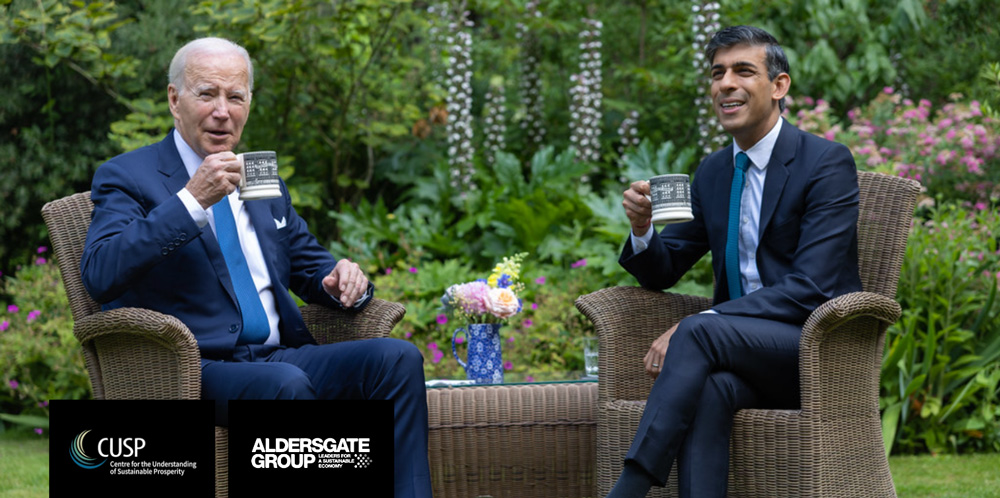
CUSP partners at the Aldersgate Group have coordinated a cross-business letter to UK Prime Minister Rishi Sunak, urging Government for leadership and stronger commitment to the green economy.

This Aldersgate Group report with CUSP calls on the UK Government to provide a strong legal basis for financial regulators to support the transition to a net zero and nature positive economy. It finds that financial regulators are limited by a narrow mandate on climate, capacity and resource constraints, and a lack of comprehensive net zero-aligned policy across the economy.

Inspired by a line dancing club in Stoke-on-Trent, and drawing principally on cultural theorist Raymond Williams, this article makes the case for appreciating the ways that cultural practices age and change over time.
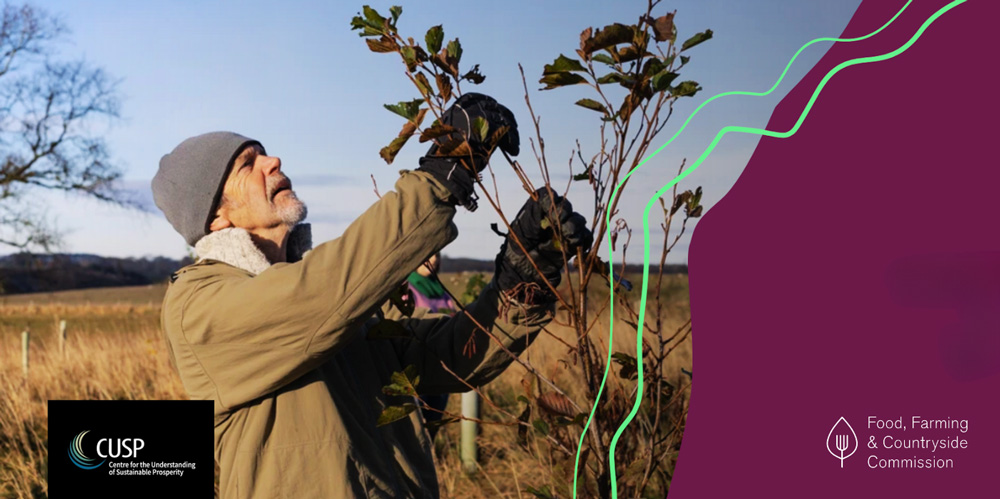
Written by CUSP researchers Fergus Lyon and Amy Burnett, this report for the UK Food, Farming and Countryside Commission seeks to understand how new and emerging markets in natural capital fit into a changing landscape for farmers.

This quantitative study of 4000 adults in the UK found that demographic factors only play a minimal role in explaining the likelihood of people being able to experience flow, suggesting that the rewards of flow may be available across society, irrespective of demographics.
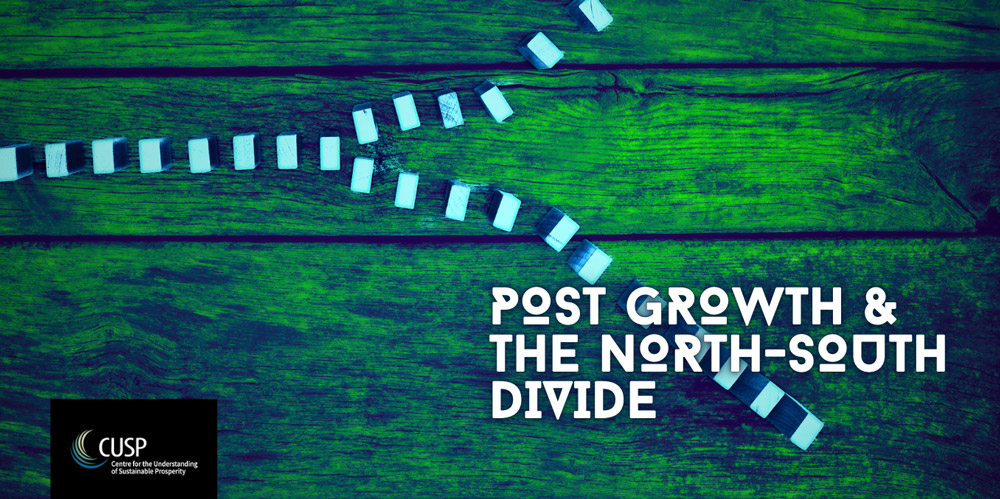
This working paper describes a two-region post-Keynesian stock-flow consistent macroeconomic model set out to analyse macroeconomic implications of a postgrowth transition in advanced countries on the economic and environmental conditions in the rest of the world.

This research provides the first assessment of the complex relationship between materialistic goal orientation and flow experiences in a shopping context. Our findings challenge the assumption that materialism impedes flow due to a lack of interest in, liking for, or goal alignment with flow-conducive activities. Rather, materialistic goals appear likely to undermine flow experiences due to factors that are consistent across activity types, such as trait levels of self-regulatory strength.
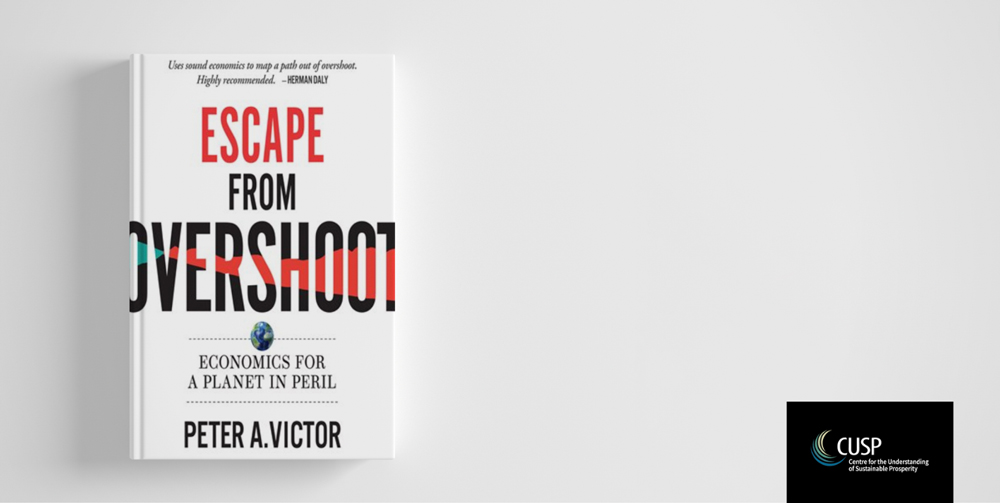
Earth is in overshoot. The relentless pursuit of economic growth in the name of “progress” has stressed the planet beyond its limits. This richly illustrated book by CUSP co-investigator Prof Peter A Victor describes the current predicament and how economics can help find a path to a post-growth future.
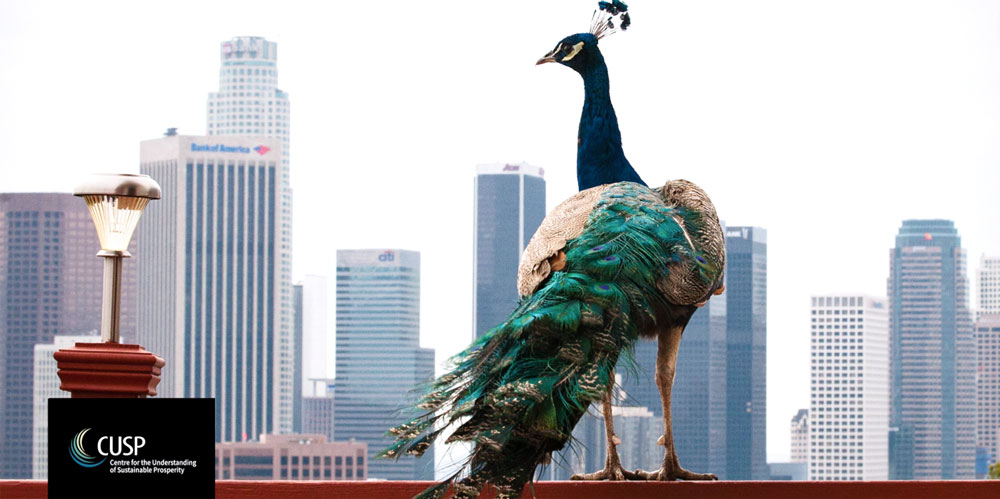
The sociology of consumption has had a fraught relationship with aesthetics, with varying levels of interest in the concept throughout the history of the discipline. Today, aesthetics is barely mentioned at all and is not considered to be relevant to enabling transitions towards more sustainable futures.

Climate activists are confronted with an increasing tension between the need for urgent climate action and a sense that it could already be too late to prevent ‘dangerous’ or ‘runaway’ climate change. This paper investigates the narrative shift, its impact on activism, and strategies that overcome its temporal contradictions.

This working paper describes an extension of the stock-flow consistent FALSTAFF model to test the existence of a monetary growth imperative. The extension is designed to simulate the phenomenon known as Baumol’s cost disease which arises from the existence of differential labour productivity rates in a mixed economy.

Wealthy countries can create prosperity while using less materials and energy if they abandon economic growth as an objective. This Nature comment piece is laying out the key challenges.

In recent years, much has been written on the role of different mental states and their potential to influence our way of thinking and the way we act. With the recent acceleration of environmental and mental health issues, alongside the limited effectiveness of existing interventions, an exploration of new approaches to deliver transformative change is required.

Stories about what living well means are critical both to the maintenance of existing ways of living and to the possibility of envisioning and transitioning toward fairer and more sustainable futures. The implications of the stories told on social media for the possibility of such futures have yet to be explored.

Given the need to a wider adoption to plant-based food consumption, our research sought to explore factors that influence consumers’ liking and willingness to pay for plant-based products. Boosting consumer wellbeing may be a means of encouraging the consumption of meat and dairy-free foods, our study finds.

The role and importance of social enterprise has continued to grow as a positive and inclusive response to the multiple economic, societal and environmental challenges of the past decade. A recent report, commissioned by the Department for Digital, Culture, Media and Sport (DCMS), examines the sector and identifies its scale in the UK.

This paper addresses the use of sustainability frameworks in embedding education for sustainability into the curriculum of Higher Education Institutions (HEIs), focusing on the paradox that sustainability frameworks must facilitate transformation of existing structures whilst also being well-enough aligned with current conditions to be readily adopted by today’s HEIs.

SMEs play a key role in transitioning to net zero. Theresia Harrer and Robyn Owen explore why funding problems are so persistent for early-stage Cleantech ventures. An institutional logics lens is adopted to analyse how key actors’ perceptions and communications of the Cleantech value proposition shape information asymmetries, and how these may be overcome.

Secure housing is a fundamental human right. However, potential conflicts between housing and sustainability objectives remain under-researched. This paper explores the impact of current English government housing policy, and alternative housing strategies, on national carbon and biodiversity goals.
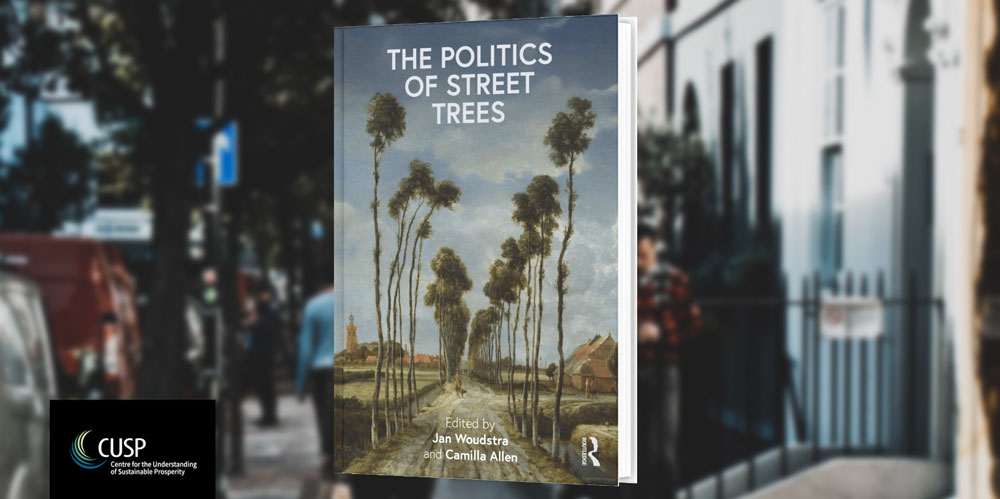
Phil Catney and John Henneberry use evolving policy and practice around protection and management of street trees as a vehicle for examining the relations between the competing paradigms of corporatism and neoliberalism, and the ways that they are expressed ‘on the ground’.

In this essay, CUSP researcher Simon Mair explores the ways that academic sustainability writing engages with economic systems and considers the performative effects of these modes of engagement. Through the lens of Capitalist Realism and Capitalocentrism, he defines three mechanisms by which non-capitalist futures are foreclosed.

Paper by Robyn Owen et al investigating how external finance, including public supported schemes, impact on the low carbon and ‘green’ growth of UK SMEs?
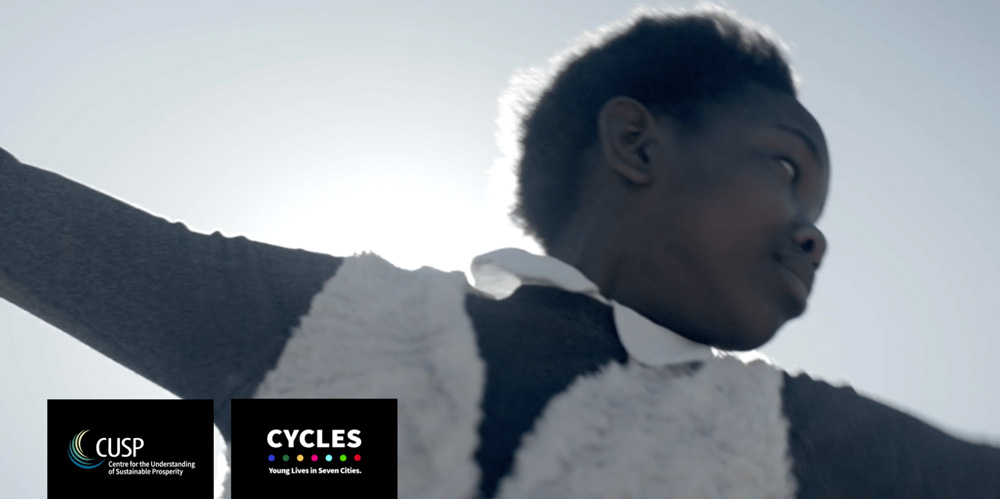
CYCLES is an international research project based in seven cities that span six continents. Following a scoping review, photo-elicitation focus groups, and a survey, we have now produced a series of brochures that present an accessible overview of key survey findings.

This Aldersgate Group report with CUSP calls for rapid action to implement and strengthen the UK Government’s proposed reforms on climate reporting and disclosure. The briefing also outlines the next steps that must be taken to support corporations and financial institutions to comply cost-effectively with these new requirements, and ensure that new reforms help deliver genuine emission reductions in the real economy.

Through a series of in-depth interviews with care workers Christine Corlet Walker et al explore the impact of investment firms on working conditions and quality of care in UK care homes. Combined with an analysis of care company accounts generating insights into the impacts of financialisation on the UK care sector, the report shows how investment firms are using extreme strategies to reduce staffing levels and cut costs in the name of profit, with appalling consequences for care.
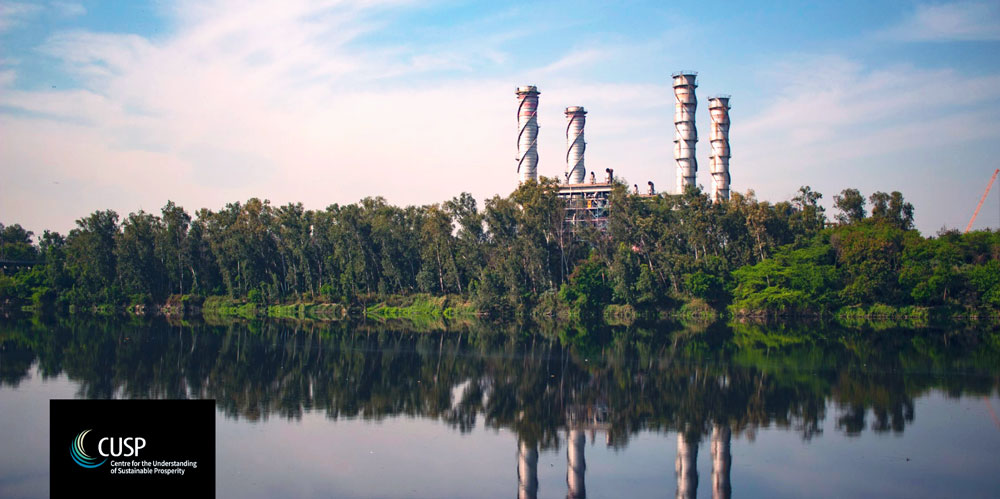
This paper presents a stock-flow consistent input–output integrated assessment model designed to explore the dual dynamics of transitioning to renewable energy while electrifying end use subject a carbon budget constraint. Unlike the majority of conventional integrated assessment model analyses, this paper does not assume the deployment of carbon dioxide removal and examines the role that alternative economic pathways (steady-states and degrowth) may play in achieving 1.5°C consistent emissions pathways.

Tackling climate change cannot be achieved solely through technological breakthroughs or new climate models. We must build on the strong social science knowledge base and develop a more visible, responsive and interdisciplinary-oriented social science that engages with people and is valued in its diversity by decision-makers from government, industry, civil society and law.

Business models providing used clothing to consumers have the potential to reduce pressure on raw materials and primary production. This research used in-depth interviews and a literature review to improve understanding of alternative business models in the fashion sector.

This paper seeks to explore how professionals in the financial sector understand the challenge that climate change presents to economy and society. It is a case study into how ‘climate-related financial risk’ is understood in a particular area of expertise—within the actuarial profession.
